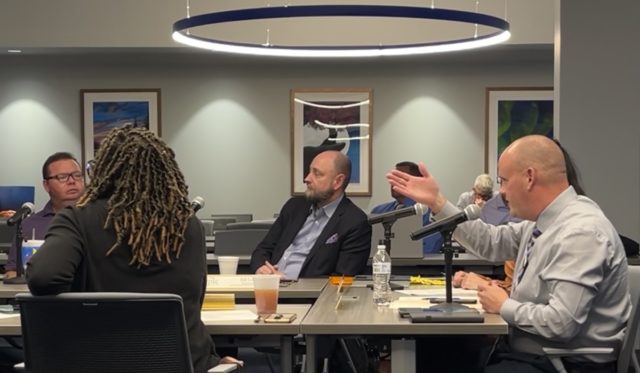

Epic Charter School board members unanimously approved the results of financial audits for its One-on-One and Blended Learning districts at a meeting Wednesday night, but the results are not yet available to the public.
The two audits were completed in a matter of weeks in preparation for a planned consolidation of the districts.
In the meeting, Jake Winkler, a CPA with Arledge & Associates, the firm that completed the audits, presented a draft of the results to the board, saying the report wouldn’t change before its final version, but he wanted to give the board the opportunity to offer feedback.
The audits had four findings, three of which Winkler said have already been addressed.
“I think the most important thing — to try and sum up my part of this — you have clean reports,” Winkler told board members. “You have a clean report. You have findings, but of the four findings that we have, three have already been resolved, and the fourth, we just got to figure something out.”
After the meeting, NonDoc requested a copy of the report that had just been officially approved by the board but was told by a spokesperson for Epic, Erin Barnes, that it was not available and that Winkler had said “The final report isn’t ready.”
Without a copy of the audit findings, the public’s knowledge of the contents of the report is based on the board’s discussion.
The audits for both districts had the same findings because they’re both part of the same Epic system, giving “credence to the fact of why we’re consolidating,” Winkler said.
‘A very difficult deadline to hit’
Winkler said Epic had been swift in addressing issues unearthed by the audits.
“As we’ve brought up issues and discovered issues that Epic needs to correct, they’ve been on top of it,” he said.
Winkler and the board discussed the only finding that has not yet been addressed, which involves a state statute that says school funds from taxpayers cannot be used to enter into contracts lasting longer than one year. For charter schools, which cannot get money from bonds to build facilities, this poses a problem because most facility leases are longer than one year, and Epic currently has lease agreements lasting longer than a year.
“It is an issue that, I feel like, needs to be resolved at the state level,” Winkler said.
Winkler said the other three findings did not have to do with misappropriated funds but with internal controls and reporting.
One finding dealt with enrollment reporting but had already been addressed as a result of a previous audit. Another was the result of a contract engagement from 2015 that had not been disclosed to the board. (Winkler said he didn’t find anything fraudulent in the contract itself.) The last finding involved contracts that had been procured before the board approved a formal contract procurement process in January of this year.
During his finance committee report, board member Trevor Hammons echoed Winkler’s positive assessment of the report.
“Audits typically take nine months — we did it in nine weeks,” Hammons said. “The unmodified report is a really big deal and we should feel good about it.”
Normally, school financial audits take place over a school year and have deadlines in the spring. Because Epic decided in March to consolidate the two districts, the final audits for both had a much tighter deadline.
“This was a very difficult deadline to hit,” Winkler said.
Consolidation
Epic’s plan to consolidate the two districts comes as the state’s largest virtual school is attempting to move past a chaotic few years.
In June, Epic founders Ben Harris and David Chaney were arrested on racketeering, embezzlement and conspiracy charges along with former chief financial officer Josh Brock. Around the time of their arrest, Harris and Chaney both made significant political donations, raising questions about whether they were attempting to influence state politics.
The board had already cut ties with Harris and Chaney at a May 2021 meeting.
State Auditor & Inspector Cindy Byrd called Harris and Chaney’s financial mismanagement “the largest amount of reported abuse of taxpayer funds in the history of the state.”
Epic’s board voted for the consolidation at its March meeting. Superintendent Bart Banfield said the move could save the school $4 to $8 million.
The Blended Learning and One-on-One virtual school districts offered slightly different models of learning for students. Board members said in March that the consolidation will not affect how students receive their education from Epic.




















